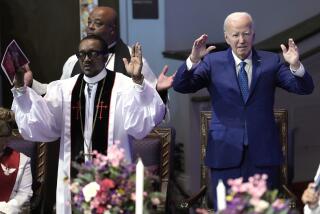Panel Examines AIDS in Black Communities
- Share via
Facing an AIDS pandemic in their community, black social activists, religious leaders, social workers and health officials gathered Saturday at USC to call on their peers to eliminate the stigma associated with the disease. The speakers urged greater sexual responsibility to contain the growing HIV-infected population.
Blacks represent 12.3% of the nation’s population, but 54% of those diagnosed with HIV/AIDS in the United States, according to the Centers for Disease Control and Prevention.
The panel blamed the startling discrepancy on social and spiritual shortcomings.
“This is not just about the disease,” said Diane Weathers, editor of Essence magazine and one of the event’s moderators. “It’s about self-esteem, poverty, ignorance and fear.”
Cleo Manago, chief executive of the Inglewood-based AmASSI health and cultural centers, said it would be difficult to address AIDS without first instilling a sense of pride and dignity in many blacks. He said a history of oppression has resulted in an inability to recognize self-worth.
“Black people need to come out of their anti-black trance,” Manago said, drawing cheers from the several hundred people who filled the lower level of the auditorium.
But there was also a sense that the nation’s powerbrokers had abandoned the issue. Speakers angrily referred to the October vice presidential debate in which Vice President Dick Cheney and then-challenger John Edwards seemed stumped when the moderator raised the issue that black women between the ages of 25 and 44 are 13 times more likely to die of the disease than their counterparts.
“I always knew they didn’t have a clue,” said Rep. Maxine Waters (D-Los Angeles). “If we’re going to tackle these issues, we’re going to have to do it ourselves.”
The panelists agreed that meant talking about AIDS and sex in churches, highly influential institutions that had largely ignored the problem before, they said.
“We did not want the church to get into our bedrooms,” said the Rev. Clyde Oden Jr., senior pastor at the Bryant Temple AME Church in Los Angeles. “Therefore, the church stayed out of those crucial and honest discussions.... We got comfortable ignoring the elephant in the room.”
Some said the community needed to be more accepting of the black gay community so that men would not fear getting regularly tested for AIDS. Women also had a responsibility to refuse to have sex with men without using protection, the panelists said.
The event was organized by the African American Community Development Initiative -- a coalition of community leaders -- and the L.A. County Department of Health Services’ Office of AIDS Programs and Policy.
In one of the more emotional moments of the event, Hydeia Broadbent, 20, infected with the virus and now an AIDS-awareness activist, told the gathering the disease was preventable if people simply used better judgment.
“I’m the one who has to go through throwing up,” Broadbent said, her voice crackling. “I’m the one who had to go to the doctor when I’d rather be at the prom. The medicine is killing me.” She then composed herself enough to remind the listeners, “Life is so precious.”
More to Read
Sign up for Essential California
The most important California stories and recommendations in your inbox every morning.
You may occasionally receive promotional content from the Los Angeles Times.













